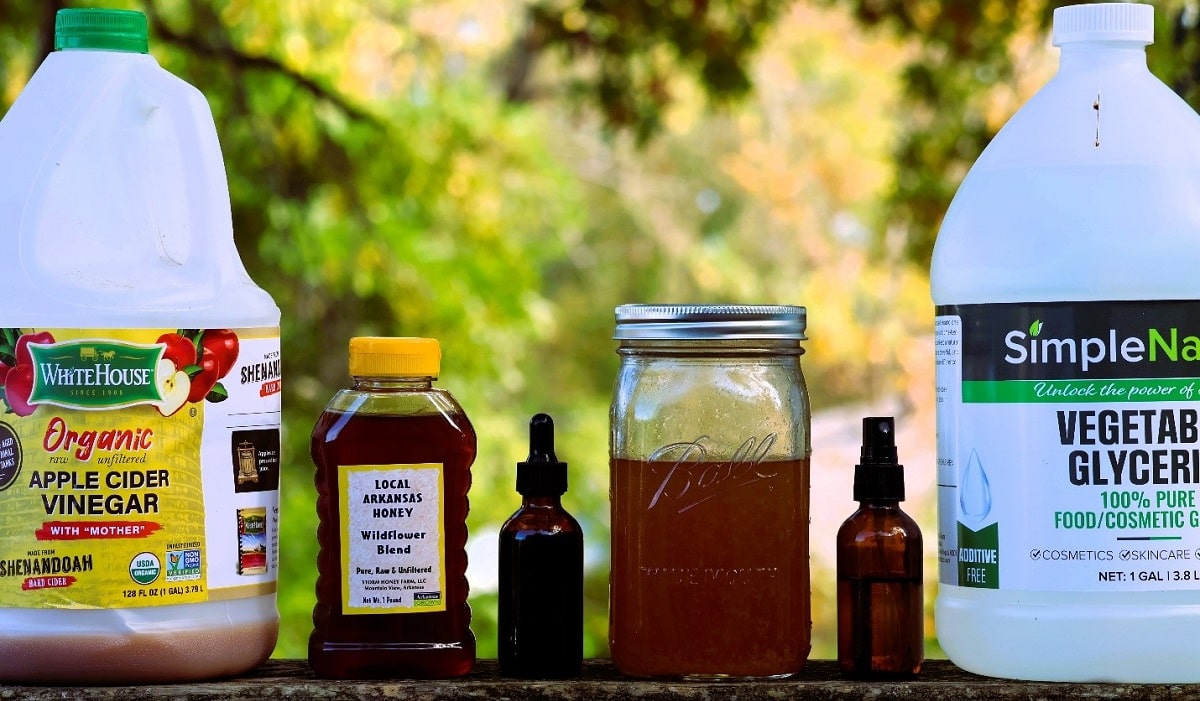Want to omit alcohol from the medicine cabinet?
There are plenty of reasons to avoid it — maybe it’s too expensive, tastes terrible, or you don’t want to give it to the kiddos. The good news is that many other ways to make herbal extracts exist.
Read on to discover the most popular alcohol-free methods, learn about their differences, and find out which is best for you!
Getting Savvy With Solvents
A solvent (aka a menstruum) can break down plant matter and draw out its medicinal constituents.
Most herbalists tend to lean heavily on alcohol as a solvent of choice. It’s easy to obtain, shelf-stable, and highly effective. However, alcohol isn’t the only menstruum around.
There are nonalcoholic options, too — though many traditionalists will be quick to point out that if a tincture doesn’t contain alcohol, it can’t really be called a tincture.
You might hear different preparations called elixirs, oxymels, or tonics. But the fact remains: these are medicinal extract preparations made much the same way you’d make a tincture.
So, what kinds of solvents can you use? Vinegar, honey, glycerin, oil, or a combination thereof can all act as alternatives, depending on your needs.
Vegetable Glycerin
Glycerin is a clear, thick, odorless liquid that is sweet with a bitter aftertaste. It is reminiscent of erythritol, and many think it tastes good. Like erythritol, vegetable glycerin is actually a type of sugar alcohol but is nontoxic and non-intoxicating.
Glycerin is probably the most popular modern-day alternative to alcohol. Preparations using it are known as glycerites and are often marketed as alcohol-free tinctures.
Glycerites have a lot going for them. They’re easy to make, relatively inexpensive, and do a swell job extracting various plant components. The shelf life is nothing to cough at, either — you can expect glycerites to last 3-5 years if you store them correctly.
Does It Work?
You’ll often hear people making blanket claims that glycerin simply isn’t as effective as alcohol or that glycerin is more effective than alcohol — neither is true; it just depends on what you’re extracting.
For example, glycerin is very effective when extracting polyphenols like those in some fruits. One research study highlights that glycerin can extract more polyphenols than alcohol under certain conditions. At the same time, another touts its efficacy with flavonoids and chlorophyll.
However, glycerin is not as effective as pure alcohol at breaking down tough barks, resins, or mushrooms. Therefore, it isn’t suitable for every application.
Unfortunately, there is no master list (yet) of herbs and their ideal solvent. We don’t have that much research, but what we do have indicates that glycerin can substitute for alcohol in many cases.
Vinegar
Vinegar is a prevalent ingredient in preparations like fire cider and a fantastic preservative for things like pickled mushrooms and sauerkraut. That means you probably already have some at home, which moves it up a peg, in my opinion.
Preparations using vinegar as a solvent are known as acetum solutions or acetic macerates. People have been using acetic macerates for thousands of years, probably as long as we’ve used alcohol.
Does It Work?
One study analyzing phenolic acids, anthocyanins, and flavonoids in vinegar tincture shows that vinegar can be a viable solvent for some herbs.
This makes sense, considering vinegar is highly acidic — and acid is pretty effective at breaking down plant matter. However, it is likely less functional than alcohol and glycerin.
Vinegar is ideal for extracting specific vitamins, minerals, and plant alkaloids. It doesn’t have the same oomph as a tub of pure acetic acid as you’d find in a lab, so it won’t be your go-to for breaking down fungi or other more substantive material.
On the flip side, it may be too acidic for some applications. It can harm mucilaginous plants like mullein and usually destroys volatile plant oils.
Vinegar is probably the cheapest and easiest solvent to obtain. It’s also antimicrobial, and since it discourages viral and bacterial activity, it may enhance the effects of medicinal preparations like fire cider.
However, vinegar is less shelf-stable than alcohol and glycerin. Acetum solutions will probably last 6-18 months, but they begin to lose their potency the longer they are kept.
Honey
Guess what — honey is a solvent! How sweet. It is an example of a Natural Deep Eutectic Solvent (NADES), which can dissolve components with a low water solubility rate.
A honey-based extract is rarely taken alone. Honey is thick and hard to dose effectively, so most herbalists mix it with other solvents. The most popular is probably vinegar, and these preparations are known as oxymels.
Oxymels are easier to dose, and the two components (vinegar and honey) extract different compounds. Depending on your herbal preparation or mixture, they may be more useful when used in tandem.
Does It Work?
One study investigated honey as a green solvent for the extraction of daidzein from Kwao Krua root, a popular supplement in Thailand. After the honey extraction, a significant presence of daidzein was found.
Honey also contains β-glucosidase, a compound that aids in the extraction process. The β-glucosidase may increase the bioavailability of certain compounds and even enhance their efficacy.
This makes sense, considering that honey often stands alone as a medicine. Like vinegar, it soothes sore throats and has an antimicrobial effect.
Oil
Many people already use oil as a solvent. When making usnea or comfrey oil, the goal is to make a salve or ointment for topical application. However, you can also make herbal oils for internal use.
These preparations are sometimes called oil macerates or oil extracts, and they can be helpful when applied correctly.
Does It Work?
This is pretty cut and dry. While most other solvents will work at least somewhat with various constituents, oil only works as a solvent for fat-soluble compounds.
It’s a good choice for fat-soluble vitamins like vitamins A, E, and K from various dark leafy greens and fruits. Oil also extracts scent and flavor, making it exceptionally useful for aromatherapy and culinary purposes.
While oil is a standard ingredient in most home kitchens, it isn’t that popular as an alcohol alternative for herbal extraction. It’s expensive, messy to work with, and tricky to ingest.
While a spoonful of honey or vegetable glycerin makes the medicine go down smoothly, a spoonful of oil makes many people gag.
Furthermore, the shelf life of oil macerates is questionable, and the learning curve is steep. If contaminated by water, herbs can cause the solution to go rancid very quickly, so you have to be very careful to dry your herbs ahead of time.
A Word About Water
Water is the most widely used solvent around. Many compounds are only soluble in water, especially heart-healthy polysaccharides like those found in functional mushrooms. That’s why, when making certain mushroom tinctures, we need to perform a dual extraction with water and alcohol.
However, water alone is not shelf-stable. If you choose to use water as a solvent, mix it with another shelf-stable solvent or drink it immediately. If you decide not to mix it, it is a tea or decoction, not an herbal extract.
Ready to get your tincture on? Now that you know about your nonalcoholic options, you’re one step closer to wildcrafting the herbal remedy of your dreams.
Read the full article here





